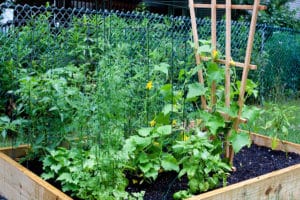Cornucopia’s Take: Gardening is a healthful hobby and allows eaters to know exactly where their food came from. Enjoy this brief tutorial for beginners on starting a garden.
Beginner’s Guide To Starting A Garden
Rodale’s Organic Life
by Jean Nick
Never gardened before? This will get you started!
 |
Growing food—even just a little of it—is rewarding and a great way to be both creative and put the absolutely freshest and most delicious stuff on the table. But what should you grow, and how much should you plant? To help you decide, consider three things:
1. Plant What You Like
This may sound obvious, but many budding gardeners are tempted to believe they can revolutionize their family’s eating habits by planting new and interesting vegetables, only to discover the abundance of, say, turnips and kohlrabi end up back in the compost pile. Your family will appreciate the garden more if you grow things they enjoy eating.
2. Do A Little Math
Start by logging what veggies and herbs you buy and eat every week. This will give you an estimate how much of them you would actually eat fresh out of your garden if they were available. A well-managed 10-by-10-foot plot, for example, can actually produce most of the fresh veggies a family of four will eat during the growing season. Online calculators like Kitchen Garden Planner and Zukeeni are great for helping you figure out what and how much to grow, too.
3. Start Small
Nothing is a bigger kill-joy than a garden you don’t have the time or energy to take care of. A good goal is to have fun and produce some tasty eats, not to declare food self-sufficiency. You will harvest and eat far more from a small, well-tended garden you look forward to visiting than from a larger one you dread going near.
4. Consider Easy-To-Grow Varieties
Deb Martin, author of Rodale’s Basic Organic Garden recommends snap peas, leaf lettuces, cherry tomatoes, pole beans, fingerling potatoes, and summer squashes. She also notes that if you end up with more than you can use of anything it’s a great time to call a local food pantry and donate the bounty.

